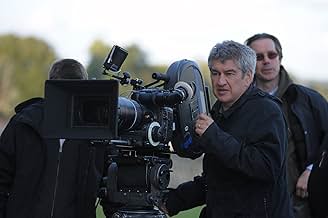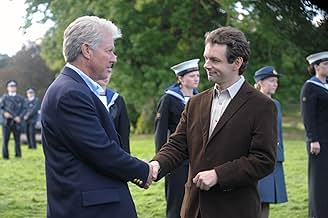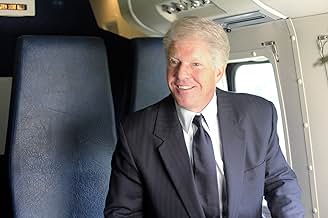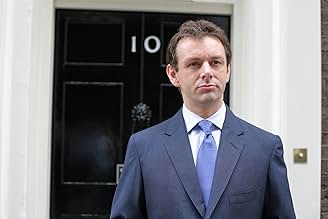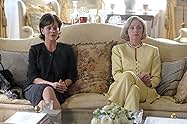AVALIAÇÃO DA IMDb
6,7/10
5,2 mil
SUA AVALIAÇÃO
Adicionar um enredo no seu idiomaA dramatization that traces former UK prime minister Tony Blair's relationships with Bill Clinton and George W. Bush.A dramatization that traces former UK prime minister Tony Blair's relationships with Bill Clinton and George W. Bush.A dramatization that traces former UK prime minister Tony Blair's relationships with Bill Clinton and George W. Bush.
- Indicado para 5 Primetime Emmys
- 1 vitória e 26 indicações no total
Gerry Adams
- Self
- (cenas de arquivo)
- (não creditado)
Peter Agnelli
- Air port worker
- (não creditado)
Madeleine Albright
- Self
- (cenas de arquivo)
- (não creditado)
Avaliações em destaque
It seems movie reviews of this work are subject to the politics and realities of the event rather than the recreation and acting of this surprisingly good story. Dennis Quaid, who I've never seen do anything above mediocre work usually just mirroring himself, was just outstanding as Bill Clinton. I think it is by far his best piece of acting to date. Equally so for Michael Sheen who I am less familiar with. Both men did a good job of presenting the personalities, complexities and subtleties of each leader. "Hillary Clinton" didn't just look the part - she was Hillary (at least what we know of her). Bill was presented as the smart politician sleaze ball and failed leader of lost promise that he was. Tony Blair is presented as both a promising leader and sympathetic character doomed to eventual destruction. The story was able to project all this in its short 90 minutes. On top of that it was educational to boot. Good job!
The movie starts with Tony Blair (Michael Sheen) coming over to America to learn from their experiences and try to reinvigorate the Labour Party. He develops a close relationship with Bill Clinton (Dennis Quaid). Then the relationships get more complex, and the movie ends with a press briefing from the real George W and Blair.
The movie is looking at this mostly from the point of view of Tony Blair. He starts off as an almost giddy schoolboy in awe of the great Bill Clinton. Michael Sheen is the best thing in this movie. He is probably the best person for the role. His superior acting skills is on full display. Dennis Quaid is not as good. He comes off as mimicking the president. Hope Davis is quite effective as Hillary. It's a pretty good recitation of the Clinton-Blair years concentrating on Northern Ireland, Lewinsky, and Kosovo from a 90 minutes HBO TV movie.
The movie is looking at this mostly from the point of view of Tony Blair. He starts off as an almost giddy schoolboy in awe of the great Bill Clinton. Michael Sheen is the best thing in this movie. He is probably the best person for the role. His superior acting skills is on full display. Dennis Quaid is not as good. He comes off as mimicking the president. Hope Davis is quite effective as Hillary. It's a pretty good recitation of the Clinton-Blair years concentrating on Northern Ireland, Lewinsky, and Kosovo from a 90 minutes HBO TV movie.
Following the "secret" story of his election (The Deal) and his first major crisis (The Queen), writer Peter Morgan ends his unofficial Tony Blair trilogy with one of the most famous aspects of the man's political career: his friendship with US President Bill Clinton, and the hopes and problems that came with it.
The film, made as a co-production between BBC and HBO (where it premiered in May 2010, though it has been picked up for theatrical release in other countries), starts in slightly familiar territory, showing us Blair (played, once again, by Michael Sheen) before he was elected, and the same goes for Clinton (Dennis Quaid), who immediately befriends the British politician on the grounds that they have a lot in common: young (politically speaking), ambitious and eager to make a difference in their respective governments. Once both men are in office, the cooperation goes very smoothly, prompting the media - and the two friends themselves - to talk about a "special relationship" between America and Great Britain. However, like most relationships, it has to face some hard times, most notably the conflict in the former Jugoslavia and, on a more private front, the Lewinsky scandal, which drives a wedge between Bill and Hillary (Leslie Hope) and Tony and Cherie (Helen McCrory, reprising her role from The Queen).
Like most of Morgan's work, The Special Relationship puts a lot of emphasis on character and performance, especially Sheen who, by now, wears Blair's clothes and mannerisms like they were a second skin, a fact that becomes more evident when archive footage is used to show the man's first encounter with a very different Commander in Chief (one George W. Bush), and he's ably assisted by the excellent Quaid who, having already played a President in American Dreamz, gets past the not-so-perfect physical resemblance between himself and the real Clinton to deliver a fully formed portrayal of a flawed, but very charismatic individual. On the female side, Hope is the usual guarantee of quality, while McCrory is a bit of a revelation, taking advantage of the increase in screen-time she has been granted compared to The Queen.
That said, the film is probably the least dramatically poignant of the trilogy. Maybe it has to do with the change in the director's chair (goodbye Stephen Frears, hello Richard Loncraine), but the real reason is the excessive familiarity of the material: whereas The Deal and The Queen dealt with the unseen (and largely fictionalized) side of their respective stories, The Special Relationship centers around a piece of Anglo-American history that has been widely covered multiple times, meaning there's very little on screen, no matter how entertaining, that people haven't heard of before.
Overall, a slightly underwhelming but consistently amusing look at the workings of English and US politics, propelled by a flawless double act and some Aaron Sorkin-like writing. If this is the last we'll see of Michael Sheen as Tony Blair, one thing is clear: it's been a very pleasant experience.
7,5/10
The film, made as a co-production between BBC and HBO (where it premiered in May 2010, though it has been picked up for theatrical release in other countries), starts in slightly familiar territory, showing us Blair (played, once again, by Michael Sheen) before he was elected, and the same goes for Clinton (Dennis Quaid), who immediately befriends the British politician on the grounds that they have a lot in common: young (politically speaking), ambitious and eager to make a difference in their respective governments. Once both men are in office, the cooperation goes very smoothly, prompting the media - and the two friends themselves - to talk about a "special relationship" between America and Great Britain. However, like most relationships, it has to face some hard times, most notably the conflict in the former Jugoslavia and, on a more private front, the Lewinsky scandal, which drives a wedge between Bill and Hillary (Leslie Hope) and Tony and Cherie (Helen McCrory, reprising her role from The Queen).
Like most of Morgan's work, The Special Relationship puts a lot of emphasis on character and performance, especially Sheen who, by now, wears Blair's clothes and mannerisms like they were a second skin, a fact that becomes more evident when archive footage is used to show the man's first encounter with a very different Commander in Chief (one George W. Bush), and he's ably assisted by the excellent Quaid who, having already played a President in American Dreamz, gets past the not-so-perfect physical resemblance between himself and the real Clinton to deliver a fully formed portrayal of a flawed, but very charismatic individual. On the female side, Hope is the usual guarantee of quality, while McCrory is a bit of a revelation, taking advantage of the increase in screen-time she has been granted compared to The Queen.
That said, the film is probably the least dramatically poignant of the trilogy. Maybe it has to do with the change in the director's chair (goodbye Stephen Frears, hello Richard Loncraine), but the real reason is the excessive familiarity of the material: whereas The Deal and The Queen dealt with the unseen (and largely fictionalized) side of their respective stories, The Special Relationship centers around a piece of Anglo-American history that has been widely covered multiple times, meaning there's very little on screen, no matter how entertaining, that people haven't heard of before.
Overall, a slightly underwhelming but consistently amusing look at the workings of English and US politics, propelled by a flawless double act and some Aaron Sorkin-like writing. If this is the last we'll see of Michael Sheen as Tony Blair, one thing is clear: it's been a very pleasant experience.
7,5/10
As we are about to attack another country under the guise of protecting human rights, this HBO movie hits the spot. Bill Clinton and Tony Blair, two fake progressives, shape the world according to their interests and political advantages. Tony Blair, as portrayed in this flick, is a naive, almost comical in his ineptitude, character. After all the unfulfilled promises and outright lies it is not surprising how unpopular he became in Great Britain. Blindly following both American presidents, but all this time building his own legacy. And he built it all right. When he left the office his approval rating was embarrassingly low. After the horrendous war campaign waged on Serbia in 1999 ( based on intentionally inflated numbers of victims, that were never found), and attack on Iraq( based on non-existing WMD), Mr. Blair is lucky that he didn't end up on trial for war crimes himself. God help us all with leaders like these people.
The Special Relationship is a disappointing and shallow film about Tony Blair's relationship with two U.S. presidents. Blair is a conundrum and probably only his wife really knows what makes him tick. Peter Morgan has almost become Blair's official biographer in film, however his take on Blair seems superficial and simple-minded. Morgan's Blair is likable, charismatic, loyal and sincere. He's also a devoted family man and a Christian. In this film he is constantly trying to do the right thing and comes off like a cross between a soap-opera character and a secular saint. Most people in Britain wouldn't buy into this interpretation.
The men and women who become the leaders of countries are usually incredibly ambitious, manipulative and complicated. They often like Clinton and Kennedy have potentially self destructive appetites. Blair we are meant to believe is just like a suburban dad. I have always been somewhat cynical about Blair's motives. When I first came across him during an election campaign in 1983 he was a socialist who recommended nationalization and nuclear disarmament. He gradually moved to the right and around 2003 became a fully fledged neocon.
This film suggests that Blair was basically a good guy trying to help the oppressed peoples of the world. For most people in Britain he is someone who put the interests of the United States above those of his own country. Not surprisingly he is still popular in the US but at home he hasn't been forgiven for supporting the Iraq War and for claiming that Saddam had weapons of mass destruction. Blair left office with approval ratings in the mid-twenties and British newspaper columnists love to write negative articles about him. The big mystery is what motivated his course of action, until his liaison with Bush he was popular. Since his resignation in 2007 Blair has done well financially out of his unwavering support for US foreign policy. In Polanski's the Ghost Writer it is even suggested that Blair was working for the CIA. It's a mystery this film doesn't help solve. MI5 has gone on record to say that Saddam wasn't a threat to Britain in 2003.
The Special Relationship is a throw-back to the biopics of the 1940s when "great men" were viewed sympathetically. I am looking forward to someday watching a film about the real Tony Blair. He is a more interesting character than the portrait painted in this simple-minded rationalization.
The men and women who become the leaders of countries are usually incredibly ambitious, manipulative and complicated. They often like Clinton and Kennedy have potentially self destructive appetites. Blair we are meant to believe is just like a suburban dad. I have always been somewhat cynical about Blair's motives. When I first came across him during an election campaign in 1983 he was a socialist who recommended nationalization and nuclear disarmament. He gradually moved to the right and around 2003 became a fully fledged neocon.
This film suggests that Blair was basically a good guy trying to help the oppressed peoples of the world. For most people in Britain he is someone who put the interests of the United States above those of his own country. Not surprisingly he is still popular in the US but at home he hasn't been forgiven for supporting the Iraq War and for claiming that Saddam had weapons of mass destruction. Blair left office with approval ratings in the mid-twenties and British newspaper columnists love to write negative articles about him. The big mystery is what motivated his course of action, until his liaison with Bush he was popular. Since his resignation in 2007 Blair has done well financially out of his unwavering support for US foreign policy. In Polanski's the Ghost Writer it is even suggested that Blair was working for the CIA. It's a mystery this film doesn't help solve. MI5 has gone on record to say that Saddam wasn't a threat to Britain in 2003.
The Special Relationship is a throw-back to the biopics of the 1940s when "great men" were viewed sympathetically. I am looking forward to someday watching a film about the real Tony Blair. He is a more interesting character than the portrait painted in this simple-minded rationalization.
Você sabia?
- CuriosidadesThe third time that Michael Sheen plays former Prime Minister Tony Blair. The other two movies in which he earlier appeared as Blair were A Rainha (2006) and The Deal (2003).
- Erros de gravaçãoWhen Tony Blair visits Washington in 1992, he is picked up from the airport in a 1998 Lincoln Town Car. Also visible in this scene is a 1995 Lincoln Town Car, two 1998 Ford Crown Victorias and a 1998 Mercury Grand Marquis.
- Citações
Bill Clinton: This Administration has been born in controversy, national shame and illegality, and it is my bet that that's the way they'll go out.
Principais escolhas
Faça login para avaliar e ver a lista de recomendações personalizadas
Detalhes
- Data de lançamento
- Países de origem
- Centrais de atendimento oficiais
- Idiomas
- Também conhecido como
- Untitled Peter Morgan Project
- Locações de filme
- Empresas de produção
- Consulte mais créditos da empresa na IMDbPro
Bilheteria
- Faturamento bruto mundial
- US$ 550.789
- Tempo de duração1 hora 33 minutos
- Cor
- Mixagem de som
- Proporção
- 2.35 : 1
Contribua para esta página
Sugerir uma alteração ou adicionar conteúdo ausente

Principal brecha
By what name was The Special Relationship (2010) officially released in Canada in English?
Responda
